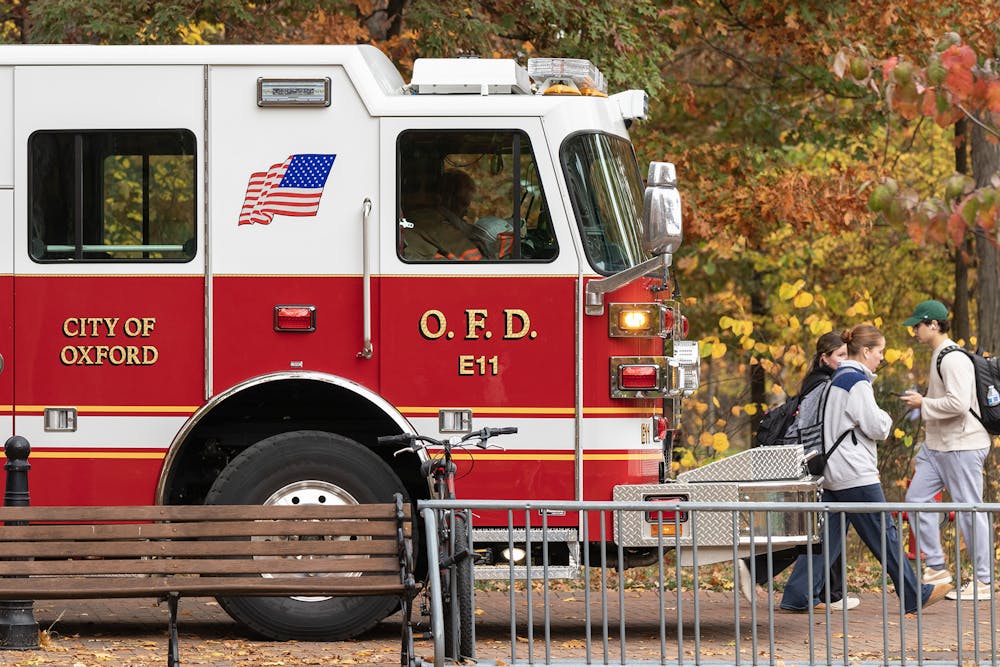With troubles beginning almost a year ago, Oxford’s fire department continues to struggle with its financial deficit caused by stretching its services thin. Oxford’s fire and EMS services currently serve Oxford, Hanover and Riley townships, as well as more than 16,000 students enrolled at Miami University living in Oxford.
Calls from Miami continue to soar, as the number has increased by 44 since The Miami Student’s last inquiry on Nov. 26, 2023, bringing the total number of calls during the 2023-2024 school year to more than 250.
According to data presented by assistant city manager Jessica Greene to the President's Executive Cabinet in a meeting in December, Miami facilities made a total of 680 calls to Oxford’s fire and EMS services in 2022, accounting for 32.8% of the total calls made to the department out of all entities it serves. Miami facilities and student housing accounted for 43.12% of fire calls to the department.
The number of false alarm calls has risen dramatically since 2021. As a college town, Oxford’s largest population groups calling to the fire department are in the 10-19 and 20-29 ranges, which make up roughly 74% of Oxford’s population. The 18-23 age group alone accounts for 32.8% of all fire and EMS calls. This data prompted the city to approach the university and ask for assistance with funds back in December.
“We said to [Miami] that we have expenses exceeding revenue, and we have to do something to secure our fire and EMS fund,” Greene said. “So we just said, we are a community, and we have to approach this together.”
The fire department currently has nine full-time firefighters and paramedics, which each responded to 338 calls in 2021, totaling 3,041 calls. In comparison, Liberty Township’s 42 firefighters and paramedics responded to a total of 3,098 calls in 2021, totaling 74 calls per fire/EMS worker.
“Our fire and EMS services are responding to many more calls than other fire departments,” Vice-Mayor Chantel Raghu said. “Who is liable if something bad happens to a student or resident since there are not enough services?”
Raghu and other members of Oxford’s community voiced their concerns to Miami’s Board of Trustees. Raghu and several other members of the Oxford community expressed their frustration in Miami’s lack of support for the fire and EMS services it uses.
“We kind of came to the ‘pay for the service or get your own’ consensus,” Raghu said. “It’s a fair question of if you’re getting provided a service, don’t you think you should pay for it?”
Present at the December execute cabinet meeting representing the university was Ted Pickerell, secretary for the Board of Trustees; Jayne Brownell, vice president for student life; David Creamer, senior vice president for finance and business services; and Randi Thomas, vice president of ASPIRE. Mayor William Snavely, Oxford City Manager Doug Elliott, Greene, Fire John Chief Detherage and Police Chief John Jones were also present at the meeting for the City of Oxford.
Enjoy what you're reading?
Signup for our newsletter
Following the meeting, Miami was willing to cooperate with the city to find a solution to the current financial crisis. Although the final plans are far from complete, a few ideas came from this meeting, including a possible increase in income tax, an increase in fees or a cut in services.
Greene and Miami representatives decided that the option they would explore more formally would be a property tax, with Miami making an in-lieu-of taxes payment for their use of the fire and EMS services. However, this plan is still in the draft phase and needs further exploration before a formal plan can be made.
“The reason we started to explore this option is because [the city] looked at who is using the fire and EMS services based on data, and the main populations using these resources are students and the elderly, which are the two population groups that do not pay income tax,” Greene said.
However, citizens like Raghu fear that this solution may put a strain on those already paying for fire and EMS services.
"We just want it to be fair,” Raghu said. “I personally don't want to see people being double taxed who are already paying for the services.”
Instead of increasing income or property taxes on the residents of Oxford who already pay some sort of tax toward the fire and EMS services, Greene is instead looking into ways for Miami to pay for the services they benefit from as well, including pushing students who live off campus to pay through their rental property owner.
Other solutions to help address the false alarm issue on Miami’s campus were discussed, including educating first-year students on fire safety within the dorm and how to avoid falsely tripping the alarm.
Greene said the city plans on meeting with Miami again possibly in early March after rerunning the deficit numbers on this year’s estimates based on last year’s data and having a work session with the city council to inform them of the “high-level” conversations the city had with Miami and get their feedback on how to proceed.
However, real change may not be made until November if the council decides on a levy to pass a property tax or any changes.




